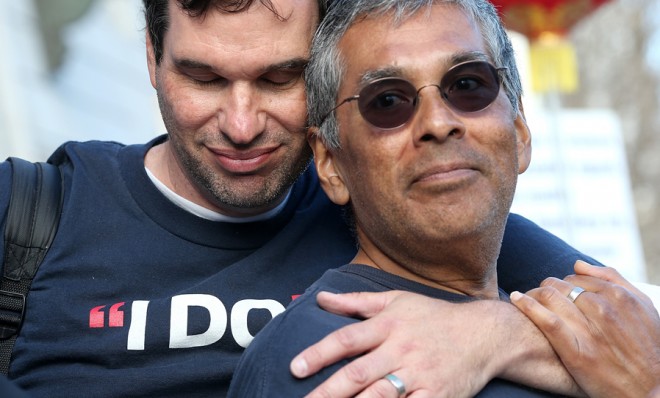How gay rights tipped so quickly


A free daily email with the biggest news stories of the day – and the best features from TheWeek.com
You are now subscribed
Your newsletter sign-up was successful
In some ways, today's Supreme Court arguments over California's Proposition 8 were overshadowed by the decision of several Democratic senators from red or purple states to openly and actively support marriage equality. Actually, even that pales in comparison to Richard Land, the key Southern Baptist political evangelist, who just said, basically, "never mind," when it comes to the next generation of evangelicals being uncomfortable about gay rights. To be sure, he still opposes gay rights, still thinks that gay marriage will lead to polygamy, and believes that anti-gay leaders are being ostracized from polite society. On that last part, he's kind of correct. The zone of tolerance for acceptable viewpoints has narrowed very quickly.
Why has the structure of the gay rights debate shifted so quickly? The Week's Peter Weber has found six reasons. I have some guesses, a few obvious ones, and a few not-so-obvious, and I'm going to try to put them in order of importance.
First: Harvey Milk had it right. All politics is personal. Self-identified gays make up about three and a half percent of the population. That means that almost everyone with a social life in America knows someone who is gay. In fact, nearly 60 percent of Americans surveyed say that someone close to them is gay. (Sarah Palin's best friend is gay.) Of those who've changed their minds on the issue, the plurality say that they expanded their circle of empathy simply because their circle came to include gay people.
The Week
Escape your echo chamber. Get the facts behind the news, plus analysis from multiple perspectives.

Sign up for The Week's Free Newsletters
From our morning news briefing to a weekly Good News Newsletter, get the best of The Week delivered directly to your inbox.
From our morning news briefing to a weekly Good News Newsletter, get the best of The Week delivered directly to your inbox.
But here's the important point: In order for this to happen, gay people had to take risks and come out. So: The pressure within the gay community to stigmatize "the closet," a pressure that can be pretty intense at times, has paid off.
It follows that people still won't come out if the social and personal penalties for doing so are high. But concerted efforts by gay rights activists and by Hollywood, working separately, have made the environment everywhere more hospitable for gay people, even in places where anti-gay prejudice remains high. Hollywood's pro-gay tilt is not a conspiracy. It is, just like Hollywood's pro-military tilt, an indelible fact driven by personal political orientation as well as economics. In conjunction, gay politics got smarter after the Massachusetts Supreme Judicial Court instituted gay marriage in that state, which provoked a revanchist backlash in a number of states.
From here, the 2008 presidential campaign plays a pivotal role. Yes, Barack Obama didn't support marriage equality at first. But the prime movers of his electoral success, the Obama generation, strongly supported complete civil and social equality for gays. Obama activated this generation. And once in office, Obama took some risks and proved his chops as a leader. The synergy between gay activists and the government will be studied for years to come, as it ought to be. Gay money bankrolled Obama's re-election; I am not overstating its impact.
Then the anti-bullying campaign, another half-grassroots, half-organized political crusade, focused attention on, specifically, anti-gay bullying of young people. It Gets Better videos apply to everyone, but the real target was (and is) gay youth. That so small a segment of the population could be the beneficiary of such widespread and popular grassroots encouragement is sort of amazing. It's also not an accident of history. Those who tend to support gay rights the most and those who have the resources to do something about it joined together in a concerted manner to lend legitimacy to the cause. One of them is Ken Mehlman, the former RNC chairman, who has devoted his life since coming out to persuading those within his party that equality's time has come. Republicans have come a long way in a short period of time, and Mehlman ought to get credit for it. (He doesn't want credit, but he'll get it.)
A free daily email with the biggest news stories of the day – and the best features from TheWeek.com
Once the barrier to gays serving in the military fell, and...nothing apocalyptic happened, and once a few states began to experiment with gay marriage, and...nothing apocalyptic happened, the only remaining arguments against same-sex unions are religious and provincial. They're small. They're associated with bigotry. No one wants to be a bigot.
And so, here we are.
Marc Ambinder is TheWeek.com's editor-at-large. He is the author, with D.B. Grady, of The Command and Deep State: Inside the Government Secrecy Industry. Marc is also a contributing editor for The Atlantic and GQ. Formerly, he served as White House correspondent for National Journal, chief political consultant for CBS News, and politics editor at The Atlantic. Marc is a 2001 graduate of Harvard. He is married to Michael Park, a corporate strategy consultant, and lives in Los Angeles.
-
 Political cartoons for February 15
Political cartoons for February 15Cartoons Sunday's political cartoons include political ventriloquism, Europe in the middle, and more
-
 The broken water companies failing England and Wales
The broken water companies failing England and WalesExplainer With rising bills, deteriorating river health and a lack of investment, regulators face an uphill battle to stabilise the industry
-
 A thrilling foodie city in northern Japan
A thrilling foodie city in northern JapanThe Week Recommends The food scene here is ‘unspoilt’ and ‘fun’
